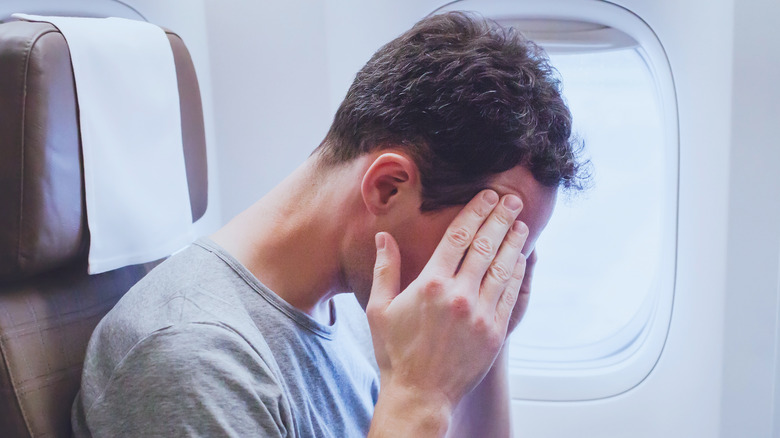How To Prevent Motion Sickness
A leisurely road trip on a family vacation isn't so leisurely when you're struggling with dizziness and trying not to vomit. Motion sickness isn't fun, but there are a few steps you can take to prevent it.
Motion sickness happens when your inner ear is sensing something different than what your eyes are seeing (via the U.S. Centers for Disease Control and Prevention). When your brain gets confusing signals from your senses, it struggles to interpret the data, according to WebMD. For example, when you're on an airplane, it looks as if you aren't moving anywhere. In reality, your inner ears are telling your brain that you're moving — and motion sickness ensues. While it can happen to anyone, it's especially common in children and pregnant women.
Most symptoms don't last very long, but they can come on very quickly. Initially, you might start sweating or feeling like you need to throw up. Other typical symptoms can include dizziness, an increase in saliva production, headaches, lethargy, loss of appetite, pale skin, and shallow breathing.
How can motion sickness be prevented?
Luckily, there are a few measures you can take to prevent motion sickness in the first place. In a car or a bus, make sure you sit up front or drive. On an airplane, try sitting over the wing (via CDC). Take over-the-counter medications, like Benadryl, Dramamine, or Antivert, 30-60 minutes before travel. Just be cautious, as they may make you drowsy (via Healthline). You can also try acupressure bands, like Sea-Bands, for more holistic relief.
Try to avoid reading or looking at your phone, and avoid alcohol and eat lightly before traveling (via WebMD). Some supplements may help alleviate stress before travel, like vitamin B6, magnesium, and 5-HTP. If motion sickness has already started, there are also some steps you can take to alleviate symptoms.
Close your eyes or focus them on the horizon. Minimizing sensory input can help your brain process information. Change positions and get some air, if possible. You may also want to try aromatherapy — inhaling peppermint or another calming scent can help. Diaphragmatic breathing can maximize the parasympathetic nervous system and reduce motion sickness symptoms, according to a 2015 study published in Aerospace Medicine and Human Performance.
If motion sickness seems unavoidable, talk to your doctor about prescription medications or long-term remedies that may help.

